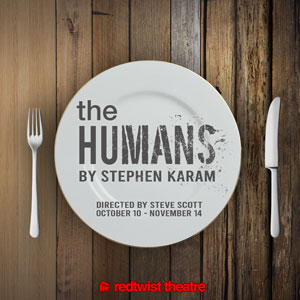
Redtwist Theatre’s “The Humans” is not without its problems.
The “backdrop” for the story is a duplex in Lower Manhattan, in a poor neighborhood in New York’s Chinatown. Brigid (Erin Christine Walsh) and Rick (Johnny Garcia), a loving couple, have recently moved into a noisy, dirty apartment (read “dump”) on Grand Street. Their hovel consists of a ground floor and a basement that is thought to flood. Amid toilet flushes, bulbs and fuses that go out, loud banging, and the like, the couple hosts Brigid’s Irish-Catholic family for a homemade Thanksgiving dinner. The rest of the Blake family consists of Brigid’s father Erik (a superior performance by Brian Parry), her mother Deirdre (Debra Rodkin), her sister Aimee (Kelli Walker), and Erik’s mother/Brigid’s grandmother Momo (amazingly portrayed by Valerie Gorman).
If there is any one word to describe Stephen Karam’s script, it is overdrawn, making the superficially disjointed 110-minute production interesting and boring at the same time. The dialogue is very much a transcription of real life: namely, what guests might say during an actual Thanksgiving dinner, whether it’s sad, important, inconsequential, thoughtful, terrible, or the like. We watch the characters constantly walk from room to room as they interact with different people and hold different conversations. We see them sit down to dinner together. With each of them experiencing troubles and sometimes emoting all at once, their dialogue as a whole gives meaningful discussions and inconsequential trivialities the same weight. This makes important aspects of life seem much too banal, and this initially distracts us from discovering the main plotline, assuming that there is one. And there is! The whole point is to see past the superficial dialogue and understand the existentialism inherent to the human condition. What this means is that life is fraught with problems, some of which can be solved, others that can be resolved, while the rest have no ready answers, such as the prospect of illness, death, and dying. Without knowing physical, mental, or emotional suffering, we cannot fully comprehend why people want to survive, or not. We learn by watching this show that what ultimately holds the family together is love. Loving those close to you makes watching their decline and their suffering all the more painful. Love also can provide the necessary support that allows each of us to better cope with tragedy.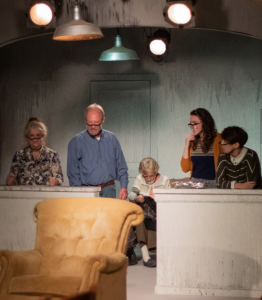
Although the script is good but difficult, we cannot get past the fact that in Redtwist’s production, the audience has to largely imagine the set. We do not see the apartment as a duplex (a feature integral to the entire story): rather, it takes up an entire length of floorspace, split by a half-wall room divider that is intended to represent a nonexistent staircase. (Ha, ha!) We watch the actors constantly moving from “upstairs” to “downstairs” as they waltz across the floor, and they constantly remark on what they can and cannot see or hear. The imaginings of the staircase (no less the missing couch) makes watching the action happening on different ends of the floor needlessly confusing and difficult. In addition, the unnecessary immersion of the audience with the actors in the “theatre in the oblong” has absolutely nothing to do with the plot. The seating arrangement requires most audience members to move our heads from side-to-side in order to take in all the action. But unlike watching a tennis match, we often don’t know which way to focus our attention, and therefore we might fail to notice what is taking place in various rooms at the exact same time. Thus for the story engine to work, the set ought to consist of two complete separate floors (above and below) such that the audience can view simultaneous action. Since Redtwist’s storefront space does not have a high-enough ceiling to accommodate the proper set, it is the wrong venue to house this particular show.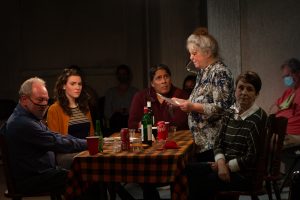
When too much is left to the audience’s imagination regarding set design, combined with the fact that too many things go awry with this faulty apartment, the show leans towards not being realistic enough. Combine that with an intentionally detailed script, and you have a recipe for disaster. What this means is that over time, we no longer take the characters as seriously as we should. The multiple levels of disconnectedness make us unable to comprehend where the story is going, so that when the climax finally arrives, we feel that it is either lackluster or silly. This subsequently makes the ending seem overdone or uninspired. That being said, the fault in this particular production probably has more to do with the awkward staging than the original source material. If staged properly, the underlying story would have been easier to grasp. The ending would have been rather powerful and could have better pointed up the existential condition of humans ultimately being lost in the dark.
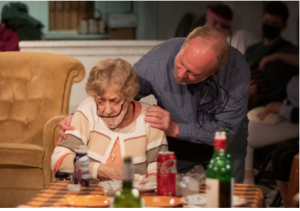 “The Humans”, directed by Steve Scott, is playing through November 14, 2021, at the Redtwist Theatre, 1044 W. Bryn Mawr Avenue, in Chicago.
“The Humans”, directed by Steve Scott, is playing through November 14, 2021, at the Redtwist Theatre, 1044 W. Bryn Mawr Avenue, in Chicago.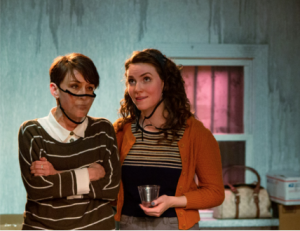
Tickets are $35-$40
Seniors/Students: $5 off
Performance schedule:
Thursday, Fridays, and Saturdays – 7:30 p.m.
Sundays – 3:00 p.m.
 Special understudy performance
Special understudy performance
Monday, October 25
For more information and to purchase tickets, please go to: https://www.redtwisttheatre.org/the-humans.
For general information, for COVID requirements, and to learn about future offerings, visit: https://www.redtwisttheatre.org/.
To see what others are saying, visit www.theatreinchicago.com, go to Review Round-Up and click at “The Humans”.







More Stories
“How to Know the Wild Flowers: A Map” reviewed by Julia W. Rath
“Baby: the Musical”
“Nana” reviewed by Jacob Davis